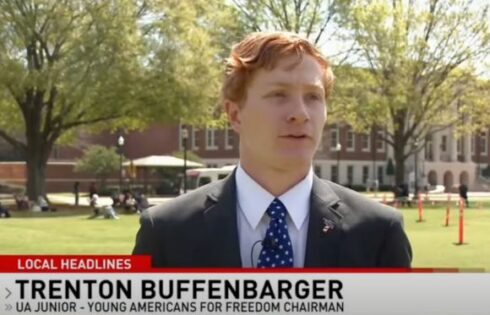
‘It had never occurred to me that I might need to be ‘trained’ how to avoid committing a crime’
In recent years colleges and universities have invested large amounts of time and money in sexual assault research and prevention, sometimes to comical effect: Yale, for instance, last year asserted that its campus is more dangerous than Detroit.
To that end, one professor is insisting that his school’s efforts at sexual assault prevention serve as “a reminder that American colleges and universities have become expert at wasting time and money.”
At the James G. Martin Center for Academic Renewal, Mark Zunac, a faculty member at the University of Wisconsin-Whitewater, writes about the tedious (and mandatory!) process that “all members of the campus community” must now go through at UWW: a “sexual assault training” put out by the school’s Title IX coordinator.
“[I]t had never occurred to me that I might need to be ‘trained’ how to avoid committing a crime,” Zunac writes, “or that there is any need to reprise rudimentary lessons in refraining from boorishness in public life.”
Be that as it may, Zunac “dutifully…logged in and began [the] training.” After being supplied with a “trigger warning,” Zunac was assured that the training was intended to be “a safe, positive, and affirming learning experience.”
Such “comfort language,” Zunac notes, “plays well in the college environment.”
As part of the training, he writes, “We were provided with dictionary definitions of things like quid pro quo, along with a helpful phonetic spelling of the phrase and counsel that such behavior is illegal and should be avoided.
“Other highlights included statistics from someplace called the Workplace Bullying Institute, which one might surmise would not exist if its statistics on workplace bullying were not astonishingly high.”
The course, Zunac writes, “provided a first-hand impression of how our students might expect to be treated in today’s typical classroom. That is, with the condescension formerly reserved for young children.”
Topics such as bullying, harassment, and intimidation, though, served as a diversionary prelude to what the training was really about. Part II was devoted to Title IX and its new role as the administrative apparatus for detecting and punishing sexual assault.
We were made to understand the nature and scope of assault and were given the profile of a typical predator, someone who, for example, eschews weapons in favor of “psychological tactics to coerce victims.” Also included was an overview of Wisconsin law regarding consent and sexual harassment and then more case studies that offered an uncomplicated look at how sexual assault might present itself to the untrained eye.
Most dubious, however, was LawRoom’s defense of what it antiseptically calls an “institutional response”—that is, an extralegal one—to assault on campus. Sexual assault, in addition to being a criminal act, also “interferes with someone’s education” and thereby becomes a de facto Title IX violation.
Of course, when it comes to sexual assault on college campuses, we aren’t always dealing with criminal behavior, per se. This offense, courtesy of official “guidance” offered our campus by the federal Office for Civil Rights, is now classified as a form of “harassment” and is to be adjudicated by campus officials.
Title IX has defined harassment down to any “unwelcome verbal or physical conduct of a sexual nature,” and thus a distinction between a constitutionally guaranteed legal defense and the kangaroo courts that now preside over Title IX hearings is warranted. Fortunately, that distinction was delineated via a chart that, if nothing else, highlighted the university’s prerogative to apply a lower standard of proof, curtail due process, and refuse access to counsel for the accused.
“I would venture,” Zunac writes, “that at some point we have either a recognition that respective campus climates are sufficiently improved, or an acknowledgement that this has all amounted to nothing but empty, expensive posturing.”
MORE: University of Maryland forces students to take sexual-assault training and pay for it
MORE: GW students can choose from six flavors of mandatory sexual-assault prevention training
Like The College Fix on Facebook / Follow us on Twitter
IMAGE: Shutterstock





Please join the conversation about our stories on Facebook, Twitter, Instagram, Reddit, MeWe, Rumble, Gab, Minds and Gettr.